#Voting Rights Act
Text
"One of the most important realities of American life is this: No nation can fully undo the effects of 345 years of state-sanctioned bigotry — from slavery to Jim Crow — in 59 years. The time period between the arrival of the first slaves on colonial shores in 1619 and the abolition of legalized discrimination with the passage of the Civil Rights Act in 1964 is simply too long, the discrimination too ingrained and the distortion of society too great to wave the wand of legal and cultural reform and quickly realize the dream of American equality."
--David French, Opinion Columnist for the The New York Times
547 notes
·
View notes
Text
"Two years ago, the biggest battles in state legislatures were over voting rights. Democrats loudly — and sometimes literally — protested as Republicans passed new voting restrictions in states like Georgia, Florida and Texas. This year, attention has shifted to other hot-button issues, but the fight over the franchise has continued. Republicans have enacted dozens of laws this year that will make it harder for some people to vote in future elections.
But this year, voting-rights advocates got some significant wins too: States — controlled by Democrats and Republicans — have enacted more than twice as many laws expanding voting rights as restricting them, although the most comprehensive voter-protection laws passed in blue states. In all, 39 states and Washington, D.C., have changed their election laws in some way this year...
Where voting rights were expanded in 2023 (so far)
Unlike two years ago, though, we’d argue that the bigger story of this year’s legislative sessions was all the ways states made it easier to vote. As of July 21, according to the Voting Rights Lab, [which runs an excellent and completely comprehensive tracker of election-related bills], 834 bills had been introduced so far this year expanding voting rights, and 64 had been enacted. What’s more, these laws are passing in states of all hues.
Democratic-controlled jurisdictions (Connecticut, the District of Columbia, Hawaii, Maryland, Maine, Michigan, Minnesota, New Mexico, New York, Rhode Island and Washington) enacted 33 of these new laws containing voting-rights expansions, but Republican-controlled states (Alabama, Arkansas, Idaho, Louisiana, Mississippi, Montana, North Dakota, Oklahoma, Tennessee, Texas, Utah, West Virginia and Wyoming) were responsible for 23 of them. The remaining eight became law in states where the two parties share power (Nevada, Pennsylvania and Virginia).
That said, not all election laws are created equal, and the most comprehensive expansive laws passed in blue states. For example:
New Mexico adopted a major voting-rights package that will automatically register New Mexicans to vote when they interact with the state’s Motor Vehicle Division, allow voters to request absentee ballots for all future elections without the need to reapply each time and restore the right to vote to felons who are on probation or parole. The law also allows Native Americans to register to vote and receive ballots at official tribal buildings and makes it easier for Native American officials to get polling places set up in pueblos and on tribal land.
Minnesota followed suit with a law also establishing automatic voter registration and a permanent absentee-voting list. The act allows 16- and 17-year-olds to preregister to vote too. Meanwhile, a separate new law also reenfranchises felons on probation or parole.
Michigan enacted eight laws implementing a constitutional amendment expanding voting rights that voters approved last year. Most notably, the laws guarantee at least nine days of in-person early voting and allow counties to offer as many as 29. The bills also allow voters to fix mistakes on their absentee-ballot envelopes so that their ballot can still count, track the status of their ballot online, and use student, military and tribal IDs as proof of identification.
Connecticut became the sixth state to enact a state-level voting-rights act, which bars municipalities from discriminating against minority groups in voting, requires them to provide language assistance to certain language minority groups and requires municipalities with a record of voter discrimination to get preclearance before changing their election laws. The Nutmeg State also approved 14 days of early voting and put a constitutional amendment on the 2024 ballot that would legalize no-excuse absentee voting.
No matter its specific provisions, each of these election-law changes could impact how voters cast their ballots in future elections, including next year’s closely watched presidential race. There’s a good chance your state amended its election laws in some way this year, so make sure you double-check the latest rules in your state before the next time you vote."
-via FiveThirtyEight (via FutureCrunch), July 24, 2023
#voting rights#voting matters#united states#us politics#new mexico#Minnesota#Michigan#Connecticut#voting rights act#ballot box#civil rights#elections#election 2024#election law#constitutional amendments#felon voting#native american#first nations
207 notes
·
View notes
Video
On This Day in 1965: Just one week after Bloody Sunday, Former President Lyndon B. Johnson addressed a joint session of Congress to urge the passage of voting rights legislation.
The Voting Rights Act was signed into law five months later, protecting voting rights for every American — but voter suppression and attacks on our democracy still threaten our access to the ballot box today.
This year alone, at least 284 bills restricting voter access have been introduced across the country. In 14 states, at least 17 new voter suppression laws will be in effect for the 2024 General Election.
We need federal voting rights protections to ensure all Americans can freely exercise our right to vote. Voting rights are on the ballot this year. Make sure you’re registered to vote NOW at weall.vote/register.
#on this day#OTD#bloody sunday#LBJ#president lyndon b johnson#lyndon b johnson#voting rights#voting rights legislation#voting rights act#VRA#voter suppression#register to vote#vote#voting
20 notes
·
View notes
Text
US Democracy: Close to Death
Pardon my language.
But we are f*cked. Yesterday (June 30, 2022), SCOTUS agreed to hear “Moore v. Harper” on its fall 2022 docket. This case deals with the authority of states to run elections (see more detail later on)*. The conservative-majority court will likely rule in favor of Moore, which would let Republican-held state legislatures appoint their own electors in the electoral college, ignoring the popular vote. In essence, Republicans wouldn’t have to repeat Jan. 6 in the future. They could simply use Republican-held statehouses to reject election results they don’t like, ending free and fair elections in the US.
Presently, there are not enough votes for Congress or the President to do anything to stop this. Congress could potentially impeach Justice Thomas for his role in the Jan. 6 insurrection but the Constitution requires a two-thirds majority Senate vote to convict a sitting Supreme Court justice. Sufficient support for this does not exist in the Senate, and is not likely to exist at any time soon.
There is only one real, legal recourse to this threat: obtaining a true Democratic majority in the US Senate, which we do not have. Senators Manchin and Sinema are unreliable at best and potentially plants at worst. They support neither the reform of or conditional exemption to the filibuster, nor “packing the court.” We need two additional Democratic senators to make their spoiler-effect opposition irrelevant. A 52-member Democratic Senate would allow the filibuster to be bypassed and open the way for the Judiciary Act to pass, which would allow President Biden to add four additional Supreme Court justice seats to reign in this current slow-motion right-wing coup. Don’t think abolishing the filibuster is right? See additional text later.**
How do we get two additional Democratic votes in the Senate? There are currently two highly-competitive Senate races for seats held by Republicans in the midterms this November: Pennsylvania (Dr. Oz (R) vs. John Fetterman (D)) and Wisconsin (party nominees undecided, primary scheduled Aug. 9, 2022). The Dems also need to hold onto every seat they currently occupy. This includes other highly-competitive seats in: Arizona, Georgia, and Nevada. I’ve never campaigned for anyone in my life before but today I signed up to volunteer with John Fetterman’s campaign because I feel like this is important.
I can’t tell anybody what to do this information, I can only provide it. But I hope that people who value laws, regulations, and policies that support the social, economic, environmental, and democratic wellbeing of a society can recognize when those things are at stake (and they are). The Republicans and their right-wing evangelical supporters know that the 2022 midterm and 2024 general elections are the last chance they have to impose their religious agenda on the country. They know the majority of Americans do not support an elimination of abortion, the banning of LGBT people from public life, or the continuous denial of the climate crisis. That is why they are using the Supreme Court to take action right before these critical elections. They should not get away with this.
“I’m too anxious or burnt to do anything.” That’s true. It’s been an exhausting past two years. But, for myself, I hate to think of the regret I might have in 2024 when a Republican-held Court, White House, and Congress enact a nationwide federal ban on abortion or LGBT people. Do I want to ask myself at that time, “was there anything else I could have done?” “Electoralism doesn’t work.” I sympathize.*** Often times it feels we elect people who don’t ultimately do anything. But I guarantee that voting will become even more of a token gesture in the future under the likely Moore v. Harper ruling if it’s allowed to proceed unchecked. “The Nation is already f*cked, there’s no point in saving it. We should just let the inevitable balkanization of America happen.” While I think current inflation and supply chains are bad, I can’t imagine how much worse they will be when the nationwide networks of food, medicine, water, household goods, consumer electronics, et al. are subject to tariffs and various petty interregional conflicts that the federal government currently mediates. Yes, the US will cease to exist one day, but let that be a day when we decide that we no longer need the federal government to aid us in living healthful, rich lives, not because of a right-wing coup.
Thank you for your time if you've read this far.
*Moore v. Harper is a Supreme Court writ of certiorari between Thomas Moore, the Republican Speaker of the North Carolina House of Representatives, and Rebecca Harper, a North Carolina citizen who is collectively filing with other North Carolinians against the Speaker. The case has to do with a Feb. 2022 North Carolina Supreme Court decision that threw out the State Legislature’s election map as gerrymandered. The NC Supreme Court ruled that the maps adopted by the NC Legislature violated the NC Constitution. The NC Supreme Court adopted remedial election maps in their place. Speaker Moore, in turn, filed a writ of certiorari with SCOTUS that it accepted June 30. The NC Republicans believe the US Constitution does not allow state supreme courts jurisprudence over elections and that state legislatures should be able to run and organize elections exclusively. SCOTUS has continuously ruled, however, since 1916 (Davis v. Hildebrant) and as recently as 2015 (Arizona State Legislature v. Arizona Independent Redistricting Commission) that the Constitution does not give unilateral election-running authority to a state legislature but rather to the public or a state’s constitution. The likely SCOTUS ruling in the fall on Moore v. Harper would overturn over a century’s worth of precedent and allow sitting state legislatures to blatantly gerrymander election maps and even the ability to ignore the popular vote.
**Don’t think abolishing the filibuster is right? The US Constitution does not support the use of the filibuster and does not require a two-thirds vote for laws. It only specifies that a two-thirds majority be used for: censure, expulsion, conviction, and treaty approval. The Senate has reformed the filibuster throughout US history. Senators used to be able to simply filibuster a motion out of the Senate without any accountability. In 1917, the Senate changed its rules to allow a two-thirds majority vote to end debate, the first such check on the filibuster. In 1975, the Senate changes its rules again and dropped this threshold from 67 to 60 senators. Clearly, the Senate has a history of changing its own rules as allowed by Article I, Section 5 of the US Constitution. It is perfectly reasonable and constitutional to either reform or end the use of the filibuster.
***Yes, electoralism is not the end-be-all of civic engagement. It is the bare minimum. If you want more than casting a vote then (good news): there’s a wealth of civil society and community-based organizations out there waiting for your talent, energy, and expertise. Getting involved can connect you to additional resources. And, yes, support mutual aid requests as you are able but mutual aid is not a replacement for actual, scalable human services, like medicine, professional care, electronic infrastructure and services, formal education, et al. that our federal state provides. This is not an “one or the other” decision. All of the tools are here. Use all of them as you are able. Campaign, vote, organize, donate, spread awareness. All of it. And anybody calling for a violent revolution is clueless. The right-wing white supremacists have been preparing for this moment four four decades, with ready-to-mobilize militias. There are no comparable and scalable left-wing militia organizations to counter this. Sure, join your local Socialist Rifle Association but SRA, as it stands now, is simply not comparable to the organization that right-wing extremists currently have. And once you have outed yourself as an active leftist gun user (in the same way that white militias use theirs), you can forget about your constitutional rights. The longer-term solution is to create locally-based power that can resist overreaches by state and federal governments.
#scotus#us supreme court#moore v harper#elections#voting rights#voting rights act#abortion#abortion rights#womens rights#us elections#us democracy#left wing#community organizing
637 notes
·
View notes
Text
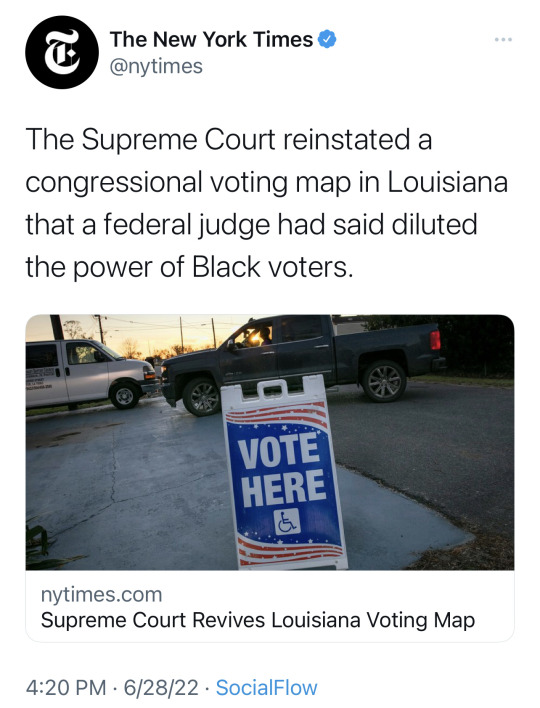
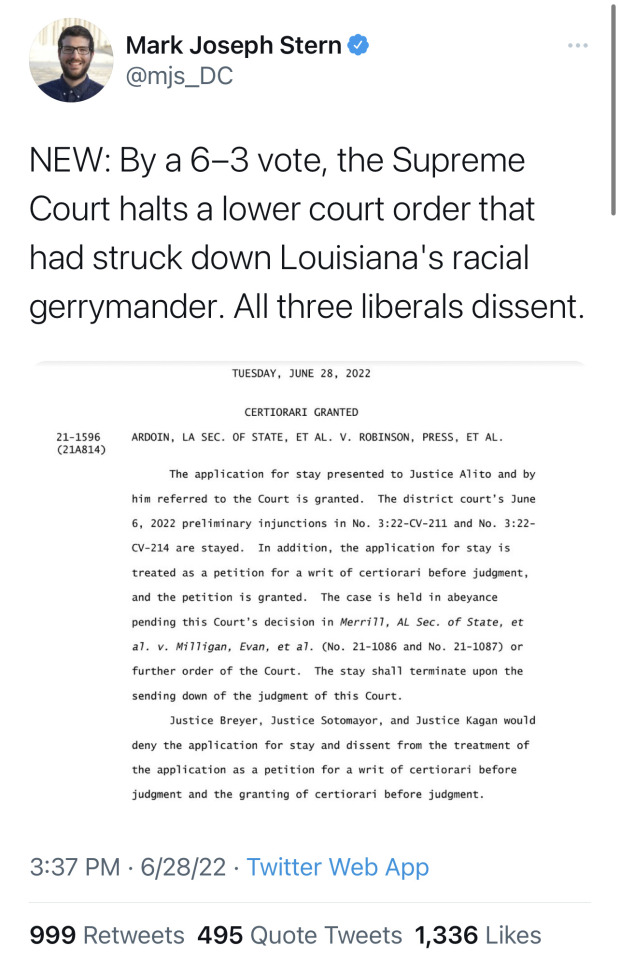
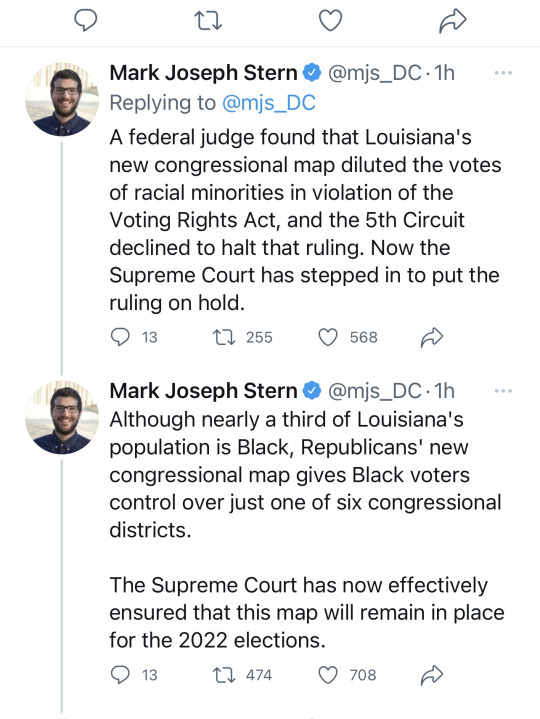
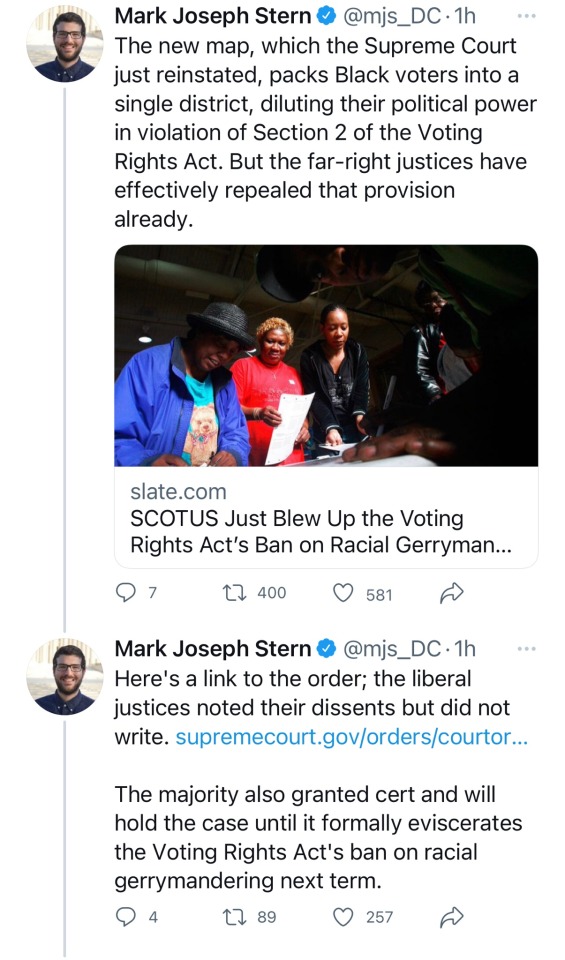
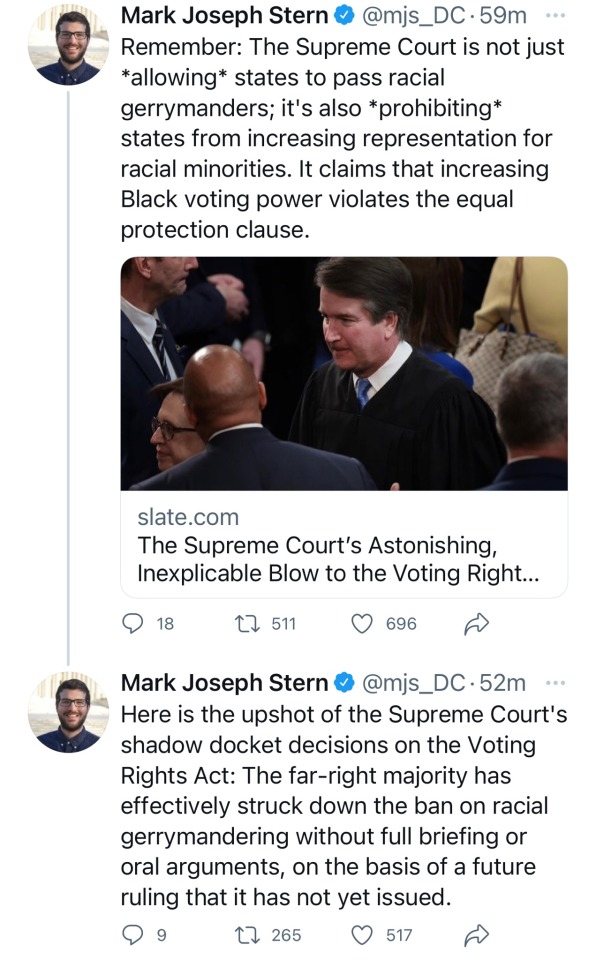
Ever since Citizens United, the Roberts Court has been actively chipping away at Democracy, but they have finally gone full mask off now.
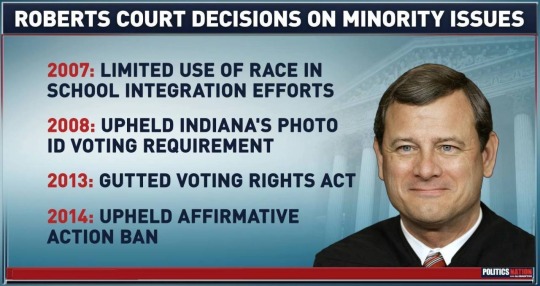
John Roberts has a long history of working against the Voting Rights Act, but legalizing Louisiana’s anti-Black, race-based gerrymandering is blatantly racist.
Roberts isn’t even being subtle about it anymore. It’s a naked power grab. He is using his Supreme Court to turn America into a patriarchal, Christofascist oligarchy.
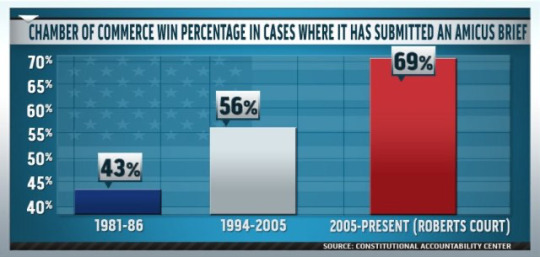
👉🏿 https://www.nytimes.com/2022/06/28/us/supreme-court-louisiana-voting-map.html
👉🏿 https://amp.cnn.com/cnn/2022/06/27/politics/supreme-court-church-state-kennedy-maine-analysis/index.html
👉🏿 https://www.motherjones.com/politics/2013/02/john-roberts-long-war-against-voting-rights-act/
👉🏿 https://apnews.com/article/supreme-court-guns-decision-58d01ef8bd48e816d5f8761ffa84e3e8
👉🏿 https://slate.com/news-and-politics/2022/03/supreme-court-voting-rights-shredder-wisconsin.html
👉🏿 https://www.vice.com/en/article/bvny5w/supreme-court-alabama-redistricting
👉🏿 https://www.npr.org/2022/06/24/1102305878/supreme-court-abortion-roe-v-wade-decision-overturn
👉🏿 https://www.reformaustin.org/campaign-finance/u-s-supreme-court-backs-ted-cruz-dumps-campaign-finance-curb/
👉🏿 https://www.reformaustin.org/campaign-finance/u-s-supreme-court-backs-ted-cruz-dumps-campaign-finance-curb/
👉🏿 https://www.latimes.com/archives/la-xpm-2005-jul-22-na-legal22-story.html
👉🏿 https://www.levernews.com/roberts-is-the-man-behind-the-curtain/
👉🏿 https://odinsblog.tumblr.com/post/684002755897163776/the-roberts-court-has-been-on-a-mission-not-enough
🗣The United States Supreme Court is a corrupt, depraved, illegitimate, Christofascist institution.
#politics#john roberts#republicans#voting rights#scotus#gerrymandering#voting rights act#white supremacy#republicans are evil#christofascism
393 notes
·
View notes
Text
By Jon Queally
Common Dreams
May 05, 2023
U.S. Supreme Court Justice Clarence Thomas and his wife Ginni Thomas are under fresh scrutiny as yet another revelation, this one reported by the Washington Post on Thursday evening shows Ginni received tens of thousands of dollars in off-the-book compensation from a powerful right-wing nonprofit shortly before the group "soon would have an interest before the court"—a pivotal voting rights case.
Based on documents reviewed by the Post, right-wing judicial activist Leonard Leo used his role as an advisor to the nonprofit, the Judicial Education Project, to ask GOP pollster Kellyanne Conway, later a top aide to President Donald Trump, to pay Ginni Thomas a large sum but keep her name off the financial records.
"Leo, a key figure in a network of nonprofits that has worked to support the nominations of conservative judges," the reporting explains, "told Conwaythat he wanted her to 'give' Ginni Thomas 'another $25K,' the documents show. He emphasized that the paperwork should have 'No mention of Ginni, of course.'"
"Leonard Leo has written the definition of court corruption. These shady schemes are a call to action to bring about ethics reform at the highest levels of the judiciary." —Kyle Herrig, Accountable.US
In response to the new revelations, Kyle Herrig, president of the public interest advocacy group Accountable.US, said "Leonard Leo has written the definition of court corruption. These shady schemes are a call to action to bring about ethics reform at the highest levels of the judiciary."
In defense of the secrecy of the payments to Ginni Thomas's firm—which according to the Post totaled $80,000 between June 2011 and June 2012, but may have been more overall—Leo said in a statement to the newspaper that it was necessary to keep her name out of any disclosures because of how "disrespectful, malicious and gossipy people" can be in the political sphere.
"I have always tried to protect the privacy of Justice Thomas and Ginni," Leo claimed.
"Each day that passes, the Supreme Court is looking less like a bench and more like an auction house. Thomas should resign immediately..." —Congresswoman Alexandria Ocasio-Cortez
Crucially, months after these payments were made to Ginni Thomas, the Judicial Education Project filed an amicus brief in the case Shelby County v. Holder, taking the side of those opposed to a key provision in the Voting Rights Act of 1965. As the Post notes:
The court struck down a formula in the Voting Rights Act that determined which states had to obtain federal clearance before changing their voting rules and procedures. Clarence Thomas was part of the 5-to-4 majority.
Thomas issued a concurring opinion in the case, arguing that the preclearance requirement itself is unconstitutional. Thomas's opinion, which was consistent with a previous opinion he wrote, favored the outcome the Judicial Education Project and several other conservative organizations had advocated in their amicus briefs. He did not cite the Judicial Education Project brief.
But progressive political observers said the corruption was impossible not to see—especially given the wave of revelations about lavish gifts and financial arrangements between Justice Thomas and billionaire Harlan Crow, a right-wing mega-donor.
"This is corruption. Plain and simple," said Rep. Alexandria Ocasio-Cortez (D-N.Y.) in reaction to the latest revelation. "And each day that passes, the Supreme Court is looking less like a bench and more like an auction house. Thomas should resign immediately and Roberts should see to it that he does."
Read more.
#ginni thomas#leonard leo#voting rights act#clarence thomas#kellyanne conway#aoc#u.s. supreme court#corruption#ethics#shelby county v. holder
71 notes
·
View notes
Text
The Republicans could lose several seats in the House of Representatives due to a surprise Supreme Court ruling which will create a new Black majority district in Alabama, according to a new study.
On Thursday the Supreme Court backed a lower court's ruling, by five votes to four, which found the districts drawn up by the state violate Section 2 of the Voting Rights Act, which prohibits "discrimination on the basis of race" in the electoral process. Chief Justice John Roberts and Brett Kavanaugh, both widely regarded as conservatives, voted with the court's three liberal members to deliver the result.
The ruling means the boundaries of Alabama's seven House districts will need to be redrawn ahead of the 2024 congressional elections, in a move that is expected to benefit the Democrats. It will also increase pressure on other Republican states to follow suit, strengthening the Democratic position in North Carolina and Louisiana.
The Cook Political Report, a non-partisan analytics website, updated its ratings for five House districts following the ruling.
Alabama's 1st and 2nd congressional districts, currently represented by Republicans Jerry Carl and Barry Moore respectively, have been changed from "solid Republican" to "toss up."
The same has happened to Louisiana's 5th and 6th districts, putting seats currently held by Republicans Julia Letlow and Garret Graves, at risk to the Democrats.

Finally North Carolina's 1st congressional district, which is occupied by Democrat Don Davis, transitions from "toss up" to "lean Democrat."
However the Cook Political Report does add a caveat to its predictions, commenting: "Until courts or legislatures enact remedial plans, it's difficult to predict exactly which Republican incumbents will be impacted."
The Supreme Court's decision could open the door to additional legal challenges in other states whose maps have faced contention from critics arguing they purposefully dilute minority voters to favor Republicans. Louisiana and Georgia—whose state legislatures passed redistricting plans with similar characteristics to Alabama's—could face renewed legal challenges to their maps on the grounds they disproportionately diminish the power of the state's voters.
Thursday's court ruling was welcomed by President Joe Biden, who repeated calls for Congress to pass wider ranging voting reform.
"Today's decision confirms the basic principle that voting practices should not discriminate on account of race, but our work is not done," he commented.
However Alabama Attorney General Steve Marshall insisted the state will continue the fight, stating: "Although the majority's decision is disappointing, this case is not over."
Derrick Johnson, president of civil rights group the National Association for the Advancement of Colored People (NAACP) saluted the decision as "a victory for Black America and a triumph for our democracy."
#us politics#news#Newsweek#2023#us supreme court#scotus#us house of representatives#republicans#conservatives#gop#Alabama#North Carolina#Louisiana#Cook Political Report#Voting Rights Act#justice john roberts#justice brett kavanaugh#rep. Jerry Carl#rep. Barry Moore#rep. Julia Letlow#rep. Garret Graves#Rep. Don Davis#Steve Marshall#National Association for the Advancement of Colored People#voting reform
45 notes
·
View notes
Note
You are an LBJ apologist
Here is a small selection of LBJ's legislative accomplishments during his five years and two months as President:
•Clean Air Act of 1963
•Food Stamp Act of 1964
•Civil Rights Act of 1964
•Creation of Equal Employment Opportunity Commission (1964)
•Economic Opportunity Act of 1964 (Creation of Head Start, Job Corps, and Community Action Programs)
•Elementary and Secondary Education Act of 1965
•Higher Education Act of 1965 (Creation of Teacher Corps and Upward Bound)
•National Endowment for the Arts
ªNational Endowment for the Humanities
ªImmigration and Nationality Act of 1965
•Social Security Amendments of 1965 (Creation of Medicare and Medicaid)
•Older Americans Act of 1965
•Creation of the Model Cities Program (1965)
•Child Nutrition Act of 1965 (Creation of school breakfast programs)
•Voting Rights Act of 1965
•Creation of VISTA (now part of AmeriCorps) (1965)
•Motor Vehicle Safety Act of 1966 (Creation of the National Highway Traffic Safety Administration)
•Fair Packaging and Labeling Act of 1966
•Child Safety Act of 1966
•Public Broadcasting Act of 1967 (Creation of PBS, NPR, and the Corporation for Public Broadcasting)
•Wholesome Meat Act of 1967
•Architectural Barriers Act of 1968 (Early disability access to public buildings law)
•Truth-In-Lending Act (1968)
•Gun Control Act of 1968
•Bilingual Education Act of 1968
•Civil Rights Act of 1968 (Fair Housing Act, Indian Civil Rights Act, and creation of Federal hate crime laws)
•Housing and Urban Development Act of 1968
So, yeah, guilty as charged.
Here are more landmark laws from the LBJ years, courtesy of the fine folks over at the @lbjlibrary.
#History#Lyndon B. Johnson#LBJ#Great Society#President Johnson#Johnson Administration#Voting Rights Act#Civil Rights Act of 1964#Civil Rights#Medicare#Medicaid#Social Security#Fair Housing Act#Life-changing Legislation#5 years and 59 days#LBJ Library
45 notes
·
View notes
Video
Courage is contagious
#tiktok#ohio#Tennessee#montana#democrats#collective action#voting rights#voting rights act#Voters#voting#solidarity#protesters#protests
46 notes
·
View notes
Text
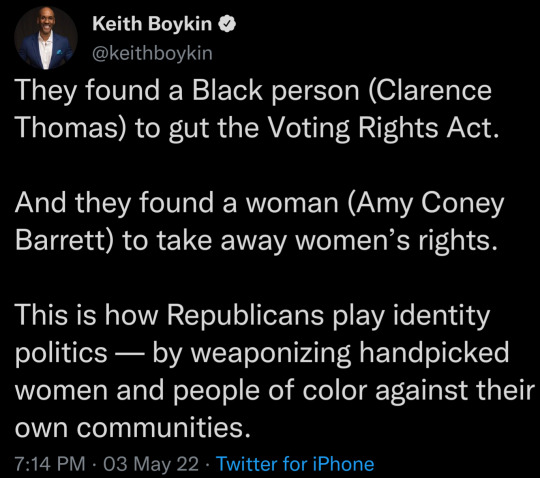
#us politics#twitter#tweet#2022#keith boykin#justice clarence thomas#voting rights act#voting rights#justice amy coney barrett#amy coney barrett#abortions#abortion bans#us supreme court#scotus#women's health#women's rights#women's bodily autonomy#reproductive rights#reproductive rights are human rights#republicans#conservatives#gop#identity politics#abortion is better than negligence#abortion is a human right#abortion is healthcare
274 notes
·
View notes
Text
The Supreme Court on Tuesday rejected an emergency bid from Alabama, setting the stage for a new congressional map likely to include a second Black majority district to account for the state’s 27% Black population.
The one-line order reflects that the feelings on the court haven’t changed since June when a 5-4 Supreme Court affirmed a lower court that had ordered the state to redraw its seven-seat congressional map to include a second majority-Black district or “something quite close to it.”
The justices’ action will have immediate consequences in Alabama and perhaps nationwide in the 2024 elections. There are currently six Republicans and one Democratic member of Congress from Alabama, but the changing makeup of the districts is likely to mean the state will pick up a new Democratic member of Congress.
16 notes
·
View notes
Text
"The Supreme Court on Thursday issued a surprising 5-4 ruling in favor of Black voters in a congressional redistricting case from Alabama, with two conservative justices joining liberals in rejecting a Republican-led effort to weaken a landmark voting rights law.
Chief Justice John Roberts and Justice Brett Kavanaugh aligned with the court’s liberals in affirming a lower-court ruling that found a likely violation of the Voting Rights Act in an Alabama congressional map with one majority Black seat out of seven districts in a state where more than one in four residents is Black. The state now will have to draw a new map for next year’s elections.
The decision was keenly anticipated for its potential effect on control of the closely divided U.S. House of Representatives. Because of the ruling, new maps are likely in Alabama and Louisiana that could allow Democratic-leaning Black voters to elect their preferred candidates in two more congressional districts.
The outcome was unexpected in that the court had allowed the challenged Alabama map to be used for the 2022 elections, and in arguments last October the justices appeared willing to make it harder to challenge redistricting plans as racially discriminatory under the Voting Rights Act of 1965...
The case stems from challenges to Alabama’s seven-district congressional map, which included one district in which Black voters form a large enough majority that they have the power to elect their preferred candidate. The challengers said that one district is not enough, pointing out that overall, Alabama’s population is more than 25% Black.
A three-judge court, with two appointees of former President Donald Trump, had little trouble concluding that the plan likely violated the Voting Rights Act by diluting the votes of Black Alabamians. That “likely” violation was the standard under which the preliminary injunction was issued by the three-judge panel, which ordered a new map drawn.
But the state quickly appealed to the Supreme Court, where five conservative justices prevented the lower-court ruling from going forward. At the same time, the court decided to hear the Alabama case.
Louisiana’s congressional map had separately been identified as probably discriminatory by a lower court. That map, too, remained in effect last year and now will have to be redrawn.
The National Redistricting Foundation said in a statement that its pending lawsuits over congressional districts in Georgia and Texas also could be affected."
-via AP, June 8, 2023
#scotus#supreme court#united states#us politics#voting#voting matters#voting rights#voting rights act#racial justice#gerrymandering#alabama#louisiana#georgia#texas#good news#hope#also Pat Robertson died today - good news really is coming in threes!
212 notes
·
View notes
Photo

For the first time in decades, Louisiana has a second majority Black congressional district! After a two-year fight for fairness and equal representation, the new congressional map was signed into law Monday when a federal appeals court ruled the state’s congressional map to be withdrawn to comply with the Voting Rights Act.
As Ashley Shelton, President of Power Coalition of Equity and Justice, said, “This is a win for Black voters and a powerful moment in Louisiana’s history.”
#louisiana#voting rights news#voting news#gerrymandering#congressional maps#voting rights act#good news in voting rights
21 notes
·
View notes
Text
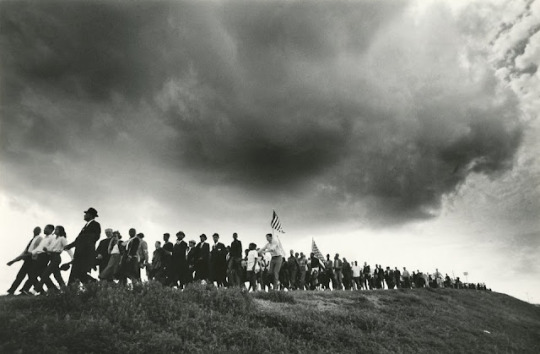
James Karales’ photograph of the Selma to Montgomery march for voting rights, Alabama, 1965 (via here)
* * * *
LETTERS FROM AN AMERICAN
March 6, 2024
HEATHER COX RICHARDSON
MAR 7, 2024
Black Americans outnumbered white Americans among the 29,500 people who lived in Selma, Alabama, in the 1960s, but the city’s voting rolls were 99% white. So, in 1963, Black organizers in the Dallas County Voters League launched a drive to get Black voters in Selma registered. The Student Nonviolent Coordinating Committee, a prominent civil rights organization, joined them.
In 1964, Congress passed the Civil Rights Act, but the measure did not adequately address the problem of voter suppression. In Selma a judge had stopped the voter registration protests by issuing an injunction prohibiting public gatherings of more than two people.
To call attention to the crisis in her city, Amelia Boynton, who was a part of the Dallas County Voters League but who, in this case, was acting with a group of local activists, traveled to Birmingham to invite Reverend Martin Luther King, Jr., to the city. King had become a household name after the 1963 March on Washington where he delivered the “I Have a Dream” speech, and his presence would bring national attention to Selma’s struggle.
King and other prominent members of the Southern Christian Leadership Conference arrived in January to push the voter registration drive. For seven weeks, Black residents tried to register to vote. County Sheriff James Clark arrested almost 2,000 of them for a variety of charges, including contempt of court and parading without a permit. A federal court ordered Clark not to interfere with orderly registration, so he forced Black applicants to stand in line for hours before taking a “literacy” test. Not a single person passed.
Then on February 18, white police officers, including local police, sheriff’s deputies, and Alabama state troopers, beat and shot an unarmed 26-year-old, Jimmie Lee Jackson, who was marching for voting rights at a demonstration in his hometown of Marion, Alabama, about 25 miles northwest of Selma. Jackson had run into a restaurant for shelter along with his mother when the police started rioting, but they chased him and shot him in the restaurant’s kitchen.
Jackson died eight days later, on February 26.
The leaders of the Southern Christian Leadership Conference in Selma decided to defuse the community’s anger by planning a long march—54 miles—from Selma to the state capitol at Montgomery to draw attention to the murder and voter suppression. Expecting violence, the Student Nonviolent Coordinating Committee voted not to participate, but its chair, John Lewis, asked their permission to go along on his own. They agreed.
On March 7, 1965, the marchers set out. As they crossed the Edmund Pettus Bridge, named for a Confederate brigadier general, Grand Dragon of the Alabama Ku Klux Klan, and U.S. senator who stood against Black rights, state troopers and other law enforcement officers met the unarmed marchers with billy clubs, bullwhips, and tear gas. They fractured John Lewis’s skull and beat Amelia Boynton unconscious. A newspaper photograph of the 54-year-old Boynton, seemingly dead in the arms of another marcher, illustrated the depravity of those determined to stop Black voting.
Images of “Bloody Sunday” on the national news mesmerized the nation, and supporters began to converge on Selma. King, who had been in Atlanta when the marchers first set off, returned to the fray.
Two days later, the marchers set out again. Once again, the troopers and police met them at the end of the Edmund Pettus Bridge, but this time, King led the marchers in prayer and then took them back to Selma. That night, a white mob beat to death a Unitarian Universalist minister, James Reeb, who had come from Massachusetts to join the marchers.
On March 15, President Lyndon B. Johnson addressed a nationally televised joint session of Congress to ask for the passage of a national voting rights act. “Their cause must be our cause too,” he said. “[A]ll of us…must overcome the crippling legacy of bigotry and injustice. And we shall overcome.” Two days later, he submitted to Congress proposed voting rights legislation.
The marchers remained determined to complete their trip to Montgomery, and when Alabama’s governor, George Wallace, refused to protect them, President Johnson stepped in. When the marchers set off for a third time on March 21, 1,900 members of the nationalized Alabama National Guard, FBI agents, and federal marshals protected them. Covering about ten miles a day, they camped in the yards of well-wishers until they arrived at the Alabama State Capitol on March 25. Their ranks had grown as they walked until they numbered about 25,000 people.
On the steps of the capitol, speaking under a Confederate flag, Dr. King said: “The end we seek is a society at peace with itself, a society that can live with its conscience. And that will be a day not of the white man, not of the black man. That will be the day of man as man.”
That night, Viola Liuzzo, a 39-year-old mother of five who had arrived from Michigan to help after Bloody Sunday, was murdered by four Ku Klux Klan members who tailed her as she ferried demonstrators out of the city.
On August 6, Dr. King and Mrs. Boynton were guests of honor as President Johnson signed the Voting Rights Act of 1965. Recalling “the outrage of Selma,” Johnson said: "This right to vote is the basic right without which all others are meaningless. It gives people, people as individuals, control over their own destinies."
The Voting Rights Act authorized federal supervision of voter registration in districts where African Americans were historically underrepresented. Johnson promised that the government would strike down “regulations, or laws, or tests to deny the right to vote.” He called the right to vote “the most powerful instrument ever devised by man for breaking down injustice and destroying the terrible walls which imprison men because they are different from other men,” and pledged that “we will not delay, or we will not hesitate, or we will not turn aside until Americans of every race and color and origin in this country have the same right as all others to share in the process of democracy.”
As recently as 2006, Congress reauthorized the Voting Rights Act by a bipartisan vote. By 2008 there was very little difference in voter participation between white Americans and Americans of color. But then, in 2013, the Supreme Court’s Shelby County v. Holder decision got rid of the part of the Voting Rights Act that required jurisdictions with a history of racial discrimination in voting to get approval from the federal government before changing their voting rules. This requirement was known as “preclearance.”
The Shelby County v. Holder decision opened the door, once again, for voter suppression. Since then, states have made it harder to vote; in 2023, at least 14 states enacted 17 restrictive voting laws. A recent study by the Brennan Center of nearly a billion vote records over 14 years shows that the racial voting gap is growing almost twice as fast in places that used to be covered by the preclearance requirement.
Democrats have tried since 2021 to pass a voting rights act but have been stymied by Republicans, who oppose such protections. Last September, on National Voter Registration Day, House Democrats reintroduced a voting rights act, now named the John R. Lewis Voting Rights Act after the man who went on from his days in the Civil Rights Movement to serve 17 terms as a representative from Georgia, bearing the scars of March 7, 1965, until he died on July 17, 2020.
On March 1, 2024, 51 Democratic senators introduced the measure in the Senate.
Speaking in Selma last Sunday at the commemoration of the 59th anniversary of Bloody Sunday, Vice President Kamala Harris shared that the first thing she sees on walking into her office is a “large framed photograph taken on Bloody Sunday depicting an injured Amelia Boynton receiving care at the foot of [the Edmund Pettus] bridge.”
“[F]or me,” she said, “it is a daily reminder of the struggle, of the sacrifice, and of how much we owe to those who gave so much before us.”
“History is a relay race,” she said. “Generations before us carried the baton. And now, they have passed it to us.”
—
LETTERS FROM AN AMERICAN
HEATHER COX RICHARDSON
#Bloody Sunday#Selma To Montgomery#history#Letters from an American#Heather Cox Richardson#voting#voting rights#voting rights act#Edmund Pettis Bridge#Civil Rights Act
3 notes
·
View notes
Link
From the June 8, 2023 article:
The Supreme Court’s 5–4 decision in Allen v. Milligan on Thursday, which found that Alabama’s congressional map violates the Voting Rights Act’s ban on racial vote dilution, sends two clear messages. First, a bare majority of the court—Chief Justice John Roberts, Justice Brett Kavanaugh, and the three liberals—believes that the VRA still plays a meaningful role in maintaining a multiracial democracy (or is willing to defer to Congress’ judgment on the matter). Second, that same majority of the court does not look kindly upon red states’ race to shred decades of precedent in an effort to wipe out the voting power of Black Americans. Roberts’ opinion for the court has a broader meaning that reaches far beyond this case: Red states cannot pressure the court into rewriting the VRA for no reason other than their shameless, brazen desire to elect more white Republicans.
13 notes
·
View notes
Text
In 1965, Congress passed the Voting Rights Act, a landmark statute designed to dramatically increase Black people’s participation in electoral politics after centuries of slavery, segregation, and second-class citizenship. Newbern, Alabama, a small town in which two-thirds of 133 residents are Black, has not held a municipal election for some 60 years. What a coincidence!
In place of a democratically elected government, the town, which is located about an hour south of Tuscaloosa, has been ruled by a small group of white people who handpick their mayoral and town council in a form of hand-me-down governance. In recent years, some of Newbern’s residents have sought to change that. In a recent filing in federal court, the residents argue that the town’s failure to hold elections violates residents’ rights under the Voting Rights Act and the Constitution, and ask the court to order the town to hold an election by November 2024.
The case is striking for multiple reasons, including, most obviously, the absurdity of the purported government’s departure from fundamental democratic principles. It is also a stark reminder of the real-world impact of federal courts in a political and legal system dominated by reactionary conservatives. Liberals are asking judges for small victories, launching last-ditch efforts to access basic rights under the Constitution. Conservatives, in contrast, are aiming much higher: For them, courts are a testing ground for novel ways to curtail rights nationwide. In federal trial courts, conservatives are having their cake and eating it too, while liberals are begging for crumbs.
youtube
The plaintiff in this case is Patrick Braxton, a Black Newbern resident who, in 2020, filed the actual, long-ignored paperwork to run for mayor. As the only legally qualified candidate, he won by default, and tried to appoint a town council accordingly. The existing town council responded by convening a secret meeting during which it decided to conduct the town’s first-ever special election. Telling no one about the new “election,” the previous mayor, Haywood “Woody” Stokes III, and his council effectively reappointed themselves to their jobs. Stokes and his cronies have since repeatedly changed the locks at town hall as part of a refusal to transfer power to the legitimate officials. They have also denied Braxton access to the town’s bank account, forcing him to run food distribution drives and otherwise carry out his mayoral duties using his own funds.
In the lawsuit, the plaintiffs are asking the court to install Braxton as the town’s rightful mayor. “Allowing the Defendants to continue their hand-me-down governance violates the basic tenets of democracy and state law,” they write. In the meantime, they say, Stokes is ignoring basic requests from his Black constituents: Although their homes occasionally flood with raw sewage, he’s refused to support the installation of a proper sewage system.
The simple request in this case—can we have a local election, please?—is a far cry from the triumphant asks being made by conservative legal movement lawyers in federal courtrooms across the country. Over the past several years, a single Trump-appointed federal judge in Texas has signed off on requests to reverse the Food and Drug Administration’s decades-old approval of drugs used in medication abortion; to force President Joe Biden to reinstate Trump-era immigration policies; and to gut a federal program that provides free contraceptive access to anyone who wants it.
Many of these exercises in judicial policymaking have come in the form of nationwide injunctions, which spiked during the Biden administration as Trump judges began wielding their power to implement the former president’s agenda by judicial fiat. During a Supreme Court oral argument last month, Justice Neil Gorsuch observed that judges issued “exactly zero universal injunctions” during President Franklin Roosevelt’s 12 years in office. “Over the last four years or so, the number is something like 60,” he said. Given that conservative judges in Texas recently declined to adopt rules that would have limited conservative activists’ ability to hand-pick judges, it seems unlikely that this trend reverses anytime soon.
The Newbern case lays bare the impact of the Republican Party’s generations-long effort to capture the judiciary. When the federal bench is this stacked with friendly faces, the conservative legal movement is free to run up the score. Everyone else is just hoping to get on the playing field.
#us politics#news#balls and strikes#2024#republicans#conservatives#newbern#alabama#Voting Rights Act#racists#racism#municipal elections#abc news#videos#Patrick Braxton#Haywood “Woody” Stokes III#conservative legal movement#Youtube#1965
6 notes
·
View notes